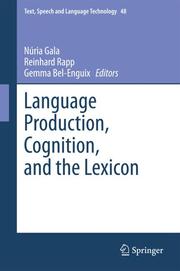-
Zusatztext
-
InhaltsangabePreface.- Michael Zock: A Life of Interdisciplinary Research and International Engagement. Mark T. Maybury.- Part I.Michael Zock and Cognitive Natural Language Processing.- Towards a Cognitive Natural Language Processing Perspective. Bernadette Sharp.- Cognitive Systems as Explanatory Artificial Intelligence. Sergei Nirenburg.- Part II.Lexicon and Lexical Analysis.- Lexical Contextualism: the Abélard Syndrome. Alain Polguère.- Predicative Lexical Units in Terminology. Marie Claude L'Homme.- TOTAKI: a Help for Lexical Access on the tip-of-the-tongue Problem. Mathieu Lafourcade and Alain Joubert.- Typing Relations in Distributional Thesauri. Olivier Ferret.- Multilingual Conceptual Access to Lexicon based on Shared Orthography: An ontology-driven study of Chinese and Japanese. Chu-Ren Huang, Ya-Min Chou.- Proportional Analogy in Written Language Data. Yves Lepage.- Multilingual Projections. Pushpak Bhattacharyya.- Part III.Semantics.- Personal Semantics. Gregory Grefenstette.- Accessing Words in a Speaker's Lexicon: Comparisons of Relatedness Measures through a Word Sense Disambiguation Task. Didier Schwab, Jérôme Goulian, Gilles Sérasset & Andon Tchechmedjiev.- Can Metaphors be Interpreted Cross-linguistically and Cross-culturally? Yorick Wilks.- Recursion and Ambiguity: a Linguistic and Computational Perspective. Rodolfo Delmonte.- Part IV.Language and Speech Analysis and Generation.- Consonants as Skeleton of Language. Statistical Evidences through Text Production. Kumiko Tanaka-Ishii.- How Natural are Artificial Languages? Rebecca Smaha & Christiane Fellbaum.- Handling Defaults and their Exceptions in Controlled Natural Language. Rolf Schwitter.- Ontology in Coq for a Guided Message Composition. Line Jakubiec-Jamet.- Bridging Gaps between Planning and Open-domain Spoken Dialogues. Kristiina Jokinen.- JSREAL: A Text Realizer for Web Programming. Nicolas Daoust and Guy Lapalme.- Part V.Reading and Writing Technologies.- Simple or not, Simple. A Readability Question? Sanja Stajner, Ruslan Mitkov, Gloria Corpas Pastor.- An Approach to Improve a Language Quality of Requirements. Juyeon Kang, Patrick Saint-Dizier.- Learning from Errors. Systematic Analysis of Complex Writing Errors for Improving Writing Technology. Cerstin Mahlow.- Part VI.Language Resources and Language Engineering.- Language Matrices and the Language Resource Impact Factor. Joseph Mariani, Gil Francopoulo.- The Fips Multilingual Parser. Eric Wehrli, Luka Nerima.- The Lexical Ontology for Romanian. Dan Tufis and Verginica Barbu-Mititelu.- Quo Vadis: A Corpus of Entities and Relations. Dan Cristea, Daniela Gîfu, Mihaela Colhon, Paul Diac, Anca Bibiri, Catalina Maranduc, Liviu-Andreai Scutelnicu.- AusTalk and the HCS vLab: an Australian Corpus and Human Communication Science Collaboration Down Under. Dominique Estival.- Knowledge Services Innovation: When Language Engineering Marries Knowledge Engineering. Asanee Kawtrakul.
-
-
Kurztext
-
The book collects contributions from well-established researchers at the interface between language and cognition. It provides an overview of the latest insights into this interdisciplinary field from the perspectives of natural language processing, computer science, psycholinguistics and cognitive science.One of the pioneers in cognitive natural language processing is Michael Zock, to whom this volume is dedicated. The structure of the book reflects his main research interests: lexicon and lexical analysis, semantics, language and speech generation, reading and writing technologies, language resources and language engineering.The book is a valuable reference work and authoritative information source, giving an overview on the field and describing the state of the art as well as future developments. It is intended for researchers and advanced students interested in the subject.
-
-
Autorenportrait
- Núria Gala. PhD in computational linguistics at Paris Sud University. She worked as a research engineer at Xerox Research Center in Grenoble before being appointed as an Assistant Professor at Aix Marseille University (2004). She currently works with the natural language processing team at LIF (Computer Science Laboratory). Her main research interests on natural language processing focus on the lexicon, building lexical resources and automatic simplification.Reinhard Rapp, PhD, Marie Curie Fellow at Aix-Marseille University. He previously worked at various institutions in Germany, Switzerland, Australia, Spain, Canada, and England. His research interests are in computational linguistics and cognitive science. His about 140 publications (among them 20 books and proceedings) deal with topics such as machine translation, dictionary extraction from parallel and comparable corpora, statistical language learning, text mining, word sense disambiguation, and thesaurus construction. He has been involved in 15 (mostly international) projects, regularly serves as a reviewer for journals and scientific meetings, and co-organized 14 international conferences, symposia and workshops.Gemma Bel Enguix. PhD in linguistics at the Rovira i Virgili University (Tarragona). She has been a postdoctoral fellow at Georgetown (Washington, DC) and Milano-Bicocca, and has held a Ramon y Cajal research position in Tarragona. Currently, she is working as a Marie Curie Researcher at LIF at Aix-Marseille Université.
Detailansicht
Language Production, Cognition, and the Lexicon
Text, Speech and Language Technology 48
ISBN/EAN: 9783319080420
Umbreit-Nr.: 6942282
Sprache:
Englisch
Umfang: xi, 586 S., 140 s/w Illustr., 586 p. 140 illus.
Format in cm:
Einband:
gebundenes Buch
Erschienen am 24.11.2014
Auflage: 1/2015


